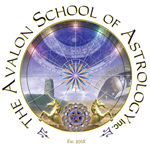DESCRIBING
THE PLANETS
Copyright © Dave
Mockaitis. All Rights Reserved
Claudius Ptolemy and Vettius Valens both studied the art of astrology
around 200 CE. Though contemporaries, there are nuances to the ways
the two men present their understandings of astrology. A close reading
of their descriptions of the planets points to a few key differences
in their views of the solar system resulting from their individual
conceptual references. Analyzing the different ways in which two
of the leading figures of the time understood astrology suggests
that there were competing views of astrology, despite the fact that
the discipline was historically quite young at this time. This diversity
of views regarding the planets may show that knowledge was transmitted
and assimilated in a variety of ways, supporting a number of astrologies
in contrast to one universally accepted practice.
In addition to presenting
a wealth of astrological information, Book I of the Tetrabiblos
contains Ptolemy’s exposition
of the planets. Each body is briefly treated with a paragraph
explaining the nature of the planet in terms of the four temperamental
qualities: hot, cold, wet and dry. Mars, for instance is described
as having “a nature chiefly to dry and to burn” (Ptolemy
14). The Greek school of thought that described the natural world
in terms of its 4-fold elemental composition was first examined
in Empedocles’ 4 “root” theory around 450 BCE,
hundreds of years before Ptolemy’s work. Plato would later
take up Empedocles’ theory and explain the roots as four
elements which make all structures in the world (Empedocles).
Hippocrates, often called the father of medicine, would eventually
codify this theory into one of the first systematic schools of
medicine (Humorism). This is a tradition of thought that began
long before Ptolemy and continued to develop in the Western history
of philosophy. Ptolemy’s astrology is closely aligned, therefore,
with the prevailing views of science at the time.
This classification
of planets and signs according to their temperamental qualities
would become a foundation of Medieval and Classical
astrology and medicine. The notion of humor and temperament
as indicators of personality grows directly from this lineage.
In
fact, many of Lilly’s techniques rely upon information derived
directly from Ptolemy’s texts (Lehman 38).
Valens’ discussion of the planets is much more colorful.
In The Anthology, Book 1, Valens describes the planets in a number
of ways. In his treatment, the planets are anthropomorphized to
match their Greek mythological namesakes. “Aphrodite is
desire and love,” for instance (Valens 4). Additionally,
each planet is often associated with a list of professions, activities
and events, grounding the description of the planet in the practical
and social reality of the time. Holden writes that Valens operated
a school of astrology (Holden 49), so it may be feasible that
Valens had more experience presenting this material and adopted
a more illustrative approach in order to communicate more effectively.
In addition to contextualizing each planet in the reality of everyday
life, Valens provides a number of planetary rulerships for each
body. Planets are given rulership over anatomical parts of the
body, metals and stones, personality characteristics and fates
in life. In Valens’ treatment of the planets, the reader
encounters a symbolic language, not unlike contemporary astrology
keywords.
Valens also mas a
more direct engagement with the concept of fate in his writing.
The Anthology has a more poetic and lyrical
tone than scientific demeanor of Ptolemy’s Tetrabiblos.
It seems to bear more resemblance to the verse presentation of
the Astronomica by Manilius. Where Ptolemy’s understanding
of the planets fits in nicely with an already existing school
of philosophy, Valens presents a more esoteric and symbolic perspective.
In the conclusion to his treatment of the planets, he references
the three types of fate described in the Corpus Hermeticum: tyche
(choice), pronoia (providence), and ananke (necessity). The Corpus
Hermeticum, a collection of wisdom texts from the second and third
centuries CE, has a strong Egyptian influence and is contemporary
to both Ptolemy and Valens. Hermes Trismegistus, the deity to
whom the texts are attributed is a fusion of Greek and Egyptian
mythological figures (Hermetica). It’s quite likely that
Valens is introducing a strain of this tradition into the more
formal astrology that is espoused by Ptolemy at the time. This
may suggest a more diffuse spread of astrological knowledge
throughout the same land.
It’s striking that two experts in such a small field could
have such diverse understandings of the planetary underpinnings.
Where Valens seems to incorporate esoteric and metaphysical teachings
into his astrology, Ptolemy describes a science that is in direct
alignment with the contemporary Greek school of thought. At this
point in history, there is a great deal of information moving
with the Mediterranean trade routes of the time. Communications
are moving between Egypt, the Middle East, the Hellenistic world
and India, not to mention all the work being translated. While
each astrologer appears to be loyal to an intellectual tradition — Aristotelianism
for Ptolemy and Esotericism for Valens — it appears that
each astrologer also may have integrated texts from sources
that were outside their native culture.
References
- Empedocles.
Wikipedia.
- Hermetica.
Wikipedia.
- Humorism.
Wikipedia.
- Holden, James Herschel. A History of Horoscopic Astrology.
American Federation of Astrologers: 1996.
- Lehman, Ph.D., Dr. J. Lee. Classical Astrology for Modern
Living. Whitford Press: 1996.
- Ptolemy, Claudius. Tetrabiblos, Book I. Robert Schmidt,
trans. Project Hindsight: Greek Track Vol. 5: 1994.
- Valens, Vettius. The Anthology, Book I. Robert Schmidt,
trans. Project Hindsight: Greek Track Vol. 4: 1993.

